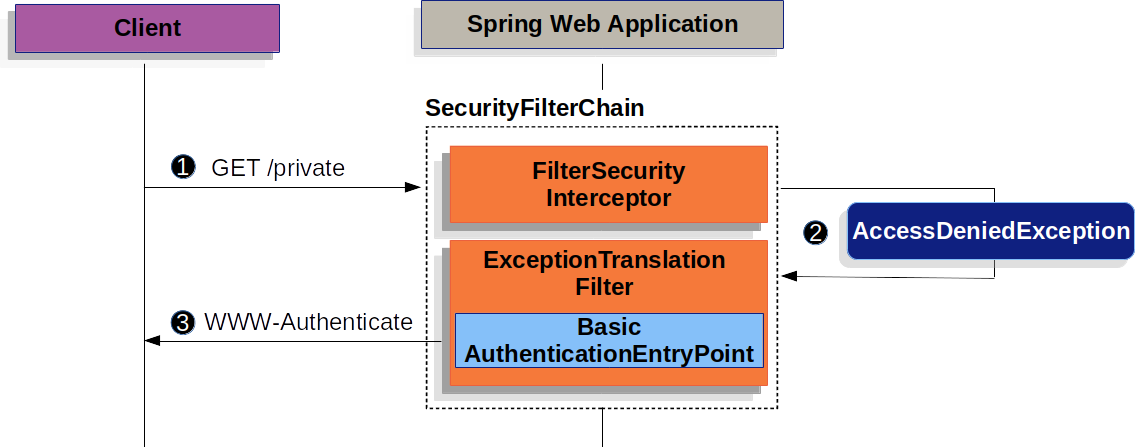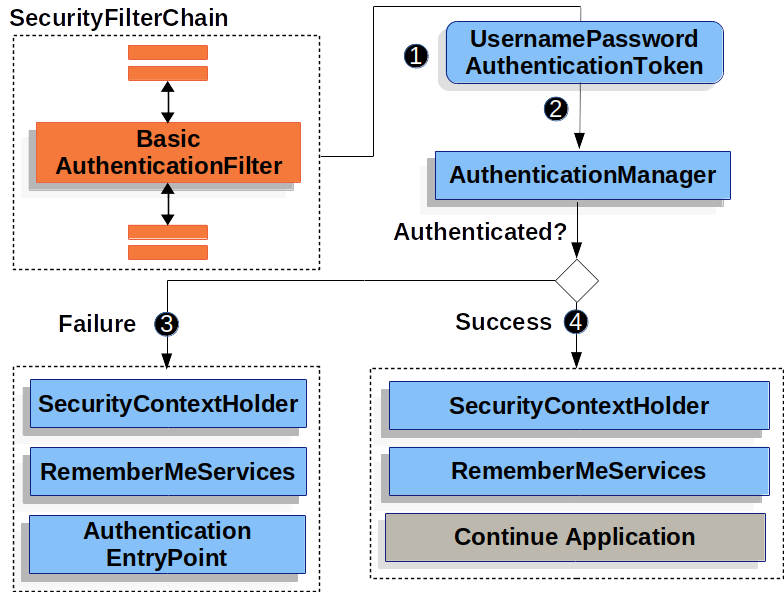|
This version is still in development and is not considered stable yet. For the latest stable version, please use Spring Security 6.4.3! |
Basic Authentication
This section provides details on how Spring Security provides support for Basic HTTP Authentication for servlet based applications.
Let’s take a look at how HTTP Basic Authentication works within Spring Security. First, we see the WWW-Authenticate header is sent back to an unauthenticated client.

The figure builds off our SecurityFilterChain diagram.
![]() First, a user makes an unauthenticated request to the resource
First, a user makes an unauthenticated request to the resource /private for which it is not authorized.
![]() Spring Security’s
Spring Security’s FilterSecurityInterceptor indicates that the unauthenticated request is Denied by throwing an AccessDeniedException.
![]() Since the user is not authenticated,
Since the user is not authenticated, ExceptionTranslationFilter initiates Start Authentication.
The configured AuthenticationEntryPoint is an instance of BasicAuthenticationEntryPoint which sends a WWW-Authenticate header.
The RequestCache is typically a NullRequestCache that does not save the request since the client is capable of replaying the requests it originally requested.
When a client receives the WWW-Authenticate header it knows it should retry with a username and password. Below is the flow for the username and password being processed.

The figure builds off our SecurityFilterChain diagram.
![]() When the user submits their username and password, the
When the user submits their username and password, the BasicAuthenticationFilter creates a UsernamePasswordAuthenticationToken which is a type of Authentication by extracting the username and password from the HttpServletRequest.
![]() Next, the
Next, the UsernamePasswordAuthenticationToken is passed into the AuthenticationManager to be authenticated.
The details of what AuthenticationManager looks like depend on how the user information is stored.
![]() If authentication fails, then Failure
If authentication fails, then Failure
-
The SecurityContextHolder is cleared out.
-
RememberMeServices.loginFailis invoked. If remember me is not configured, this is a no-op. -
AuthenticationEntryPointis invoked to trigger the WWW-Authenticate to be sent again.
![]() If authentication is successful, then Success.
If authentication is successful, then Success.
-
The Authentication is set on the SecurityContextHolder.
-
RememberMeServices.loginSuccessis invoked. If remember me is not configured, this is a no-op. -
The
BasicAuthenticationFilterinvokesFilterChain.doFilter(request,response)to continue with the rest of the application logic.
Spring Security’s HTTP Basic Authentication support in is enabled by default. However, as soon as any servlet based configuration is provided, HTTP Basic must be explicitly provided.
A minimal, explicit configuration can be found below:
-
Java
-
XML
-
Kotlin
protected void configure(HttpSecurity http) {
http
// ...
.httpBasic(withDefaults());
}<http>
<!-- ... -->
<http-basic />
</http>fun configure(http: HttpSecurity) {
http {
// ...
httpBasic { }
}
}
